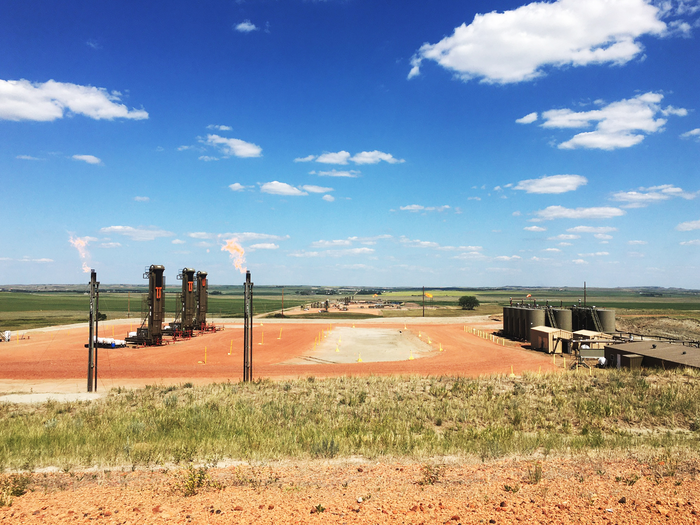Methane from flaring by oil companies much bigger threat to climate than previously thought, study warns
Findings highlight need for better measurement of flare performance across the world

The 160-year-old oil industry practice of flaring to burn off associated emissions during petroleum extraction could be releasing five times more amount of methane in the US than previously thought, according to a new study.
While burning off the powerful greenhouse gas methane at oil and gas wells was thought to keep it from escaping into the atmosphere, the new study, published in the journal Science on Thursday, says the effectiveness of the process has been overestimated.
Based on the new findings, researchers, including those from the University of Michigan in the US, say fixing issues with flaring can cut greenhouse gas emissions the equivalent of removing 3 million cars off roads.
Methane, or natural gas, is a byproduct of oil production, and when it is not cost-effective to capture the gas, it must be safely disposed of.
Since the dawn of gas extraction in the US, the oil industry has adopted flaring as a method to convert the gas into carbon dioxide, which is relatively less harmful as a planet-heating gas on a pound-by-pound basis compared to methane.
Until now, oil industry operators and regulators have assumed flares are constantly lit and that they burn off 98 per cent of methane when in operation.
However, data from aerial surveys in the three US geographical basins home to over four-fifths of flaring operations in the country suggests these assumptions are wrong.
The study found that flares were unlit about 3-5 per cent of the time, and even when lit, they were operating at low efficiency.
Taken together, researchers say, the average effective flaring efficiency rate could only be about 91 per cent.
“There is a lot more methane being added to the atmosphere than currently accounted for in any inventories or estimates,” study co-author Eric Kort said in a statement.
In the study, scientists made 13 flights in planes equipped with air monitoring equipment over three years to assess how much methane and carbon dioxide is released from flares across oil and gas production basins.
This could help them estimate the destruction removal efficiency of flaring at individual sites.
“If the flare is operating as it should be, there should be a large carbon dioxide spike and a relatively small methane spike. And depending on the relative enhancement of those two gasses, we can tell how well the flares are performing,” study lead author Genevieve Plant said.
The findings, according to the researchers, highlight the need for better measurement of the efficiency of flaring across the world, and “represents a heretofore unrealized – or at least greatly underestimated – large source of methane emissions with known mitigation options.”
With over 100 countries, including the US, making the Global Methane Pledge last year to restrict natural gas emissions, researchers say flaring could be source of methane emissions that is “quite addressable.”
“This study adds to the growing body of research that tells us that the oil and gas industry has a flaring problem. The Environmental Protection Agency and Bureau of Land Management should implement solutions that can help to end the practice of routine flaring,” Jon Goldstein from the Environmental Defense Fund, one of the research partners, said.
“With management practices and our better understanding of what’s happening to these flares, we can reduce this source of methane in a tangible way,” Dr Plant added.






Join our commenting forum
Join thought-provoking conversations, follow other Independent readers and see their replies
Comments